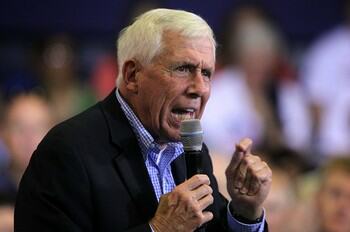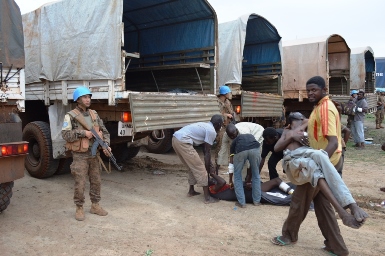US congressman warns South Sudan could become the next Rwanda
April 30, 2014 (WASHINGTON) – US congressman Frank Wolf has called on president Barack Obama to send former presidents Bill Clinton and George W. Bush to South Sudan to help resolve the ongoing crisis, amid warnings the conflict is eerily reminiscent of the genocide that unfolded in Rwanda 20 years ago.

Wolf made the comments at a press conference in Washington on Wednesday in which he showed graphic photos of mass killings taken by an expert who witnessed the atrocities taking place during a recent wave of ethnic violence.
“I stand before you as concerned as I have ever been about the state of affairs in South Sudan and the potential for the recent violence to spiral into genocide – a genocide that could defy even the horrors of Rwanda given the oil reserves that are in play,” he said.
“MORAL OBLIGATION”
The US played a pivotal role in South Sudan’s secession from Sudan in 2011 following the signing of a peace agreement in 2005 aimed at ending the more than two-decades-long conflict, and thus had a “moral obligation to act”.
“President Obama must do more to resolve this crisis. America helped give birth to South Sudan,” Wolf said.
“Both sides are at fault and by immediately dispatching president Clinton and president Bush to help negotiate a halt to these killings, we would unequivocally convey to the long-suffering people of that nation that this is a US foreign policy priority,” he added.
Wolf’s comments come ahead of a visit to the capital, Juba, by secretary of state John Kerry as the US warns it is considering targeted sanctions on South Sudan.
The alleged massacre of more than 200 civilians sheltering in a mosque after rebel troops recaptured Unity state capital Bentiu from government forces has sparked international condemnation.
Rebels are accused of carrying out targeted killings after rounding up civilians based on ethnicity and nationality.
UN high commissioner for human rights Navi Pillay and special envoy for the prevention of genocide Adama Dieng were in South Sudan this week where they held high level meetings with president Salva Kiir and former vice-president turned rebel leader Riek Machar as part of investigations into the circumstances surrounding the recent killings.
Wolf himself has travelled to both Sudan and South Sudan on several occasions and is widely recognised in Congress for his work in the region.
CALLS FOR US TO ACT
He has been pushing the Obama administration in recent months to do more to address the crisis, which erupted in mid-December after simmering political tensions in the country turned violent.
The conflict has pitted the country’s army and members of Kiir’s Dinka tribe against pro-Machar rebel forces, comprising largely of defected soldiers and ethnic militias from the Nuer group.
Wolf said unless Obama intervenes to help stem ongoing violence in the country he may be forced to apologise for foreign policy failures just as Clinton did in Rwanda in March 1998.
“If nothing is done to stop the senseless killing in South Sudan, it will be on president Obama’s conscience,” he said.
Nearly a million perished in a horrific 100-day killing spree in Rwanda in 1994 as the international community, including the US, largely turned a blind eye.
Clinton, who has described the events in Rwanda as his “personal failure”, later apologised in Kigali for not doing more to stop the violence.
LASTING RELATIONS
In December, Wolf publicly called on Kerry to enlist the help of Bush to engage the leaders of South Sudan to bring an end to the crisis.
The Bush administration played a key role in negotiating the 2005 Comprehensive Peace Agreement (CPA) and is known to have developed lasting diplomatic relations with South Sudan’s current leaders during his presidency.
“Both of these men have done a great deal on this issue and have remained invested in Africa beyond their presidencies,” Wolf said. “This pair of statesman hailing from two different parties would send a powerful message to the warring factions,” he added.

“I have heard of civilians, including women and children indiscriminately targeted and killed; I learned of houses of worship turned from places of sanctuary to mass graves; I have been told of ethnic divisions that now run so deep they could take a generation to heal,” he said.
“I have to believe cables are being sent to Washington that tell this same story. People who are in a position to help know what is happening. It is time to do something, or this is going to be Rwanda all over again,” he added.
ENHANCE US POLICY
On Tuesday, the Enough Project and Humanity United released an open letter to Kerry and ambassadors Susan Rice and Samantha Power, calling for a major of US policy towards Sudan and South Sudan.
“The US cannot positively influence outcomes in Sudan and South Sudan without fundamentally recalibrating its policy approach, the advocacy groups said.
The letter identifies the promotion of accountability, as well as support for peace and democratic transformation as three key areas in which the US should do more to support both countries.
The letter calls for the appointment of separate envoys and two full-time teams of experts and seasoned diplomats to better address specific issues affecting the two countries.
“We believe the enormity of the crisis in both countries requires someone of stature leading efforts on South Sudan and another official leading the efforts on Sudan,” the letter said.
The groups said increased diplomatic support for civil society, particularly women, youth and traditional leaders at the grassroots level, to ensure there voices are heard during peace negotiations.
Peace talks resumed this week in the Ethiopian capital, Addis Ababa, but participation has been restricted to rebel and government delegations only.
Negotiations between the two warring factions have yet to yield a breakthrough, with a January ceasefire deal failing to halt violence on the ground.
(ST)
